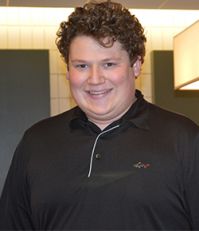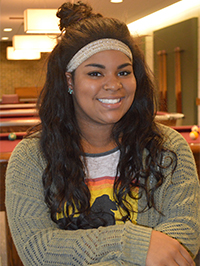For students battling anxiety and depression, sometimes the greatest stress comes from seeking success.
In today’s culture of high-stakes testing, high-cost college and all-everything excellence, getting anything less than an A on an exam can push a student’s panic button. So say local students who work to help their peers suffering from mental-health issues.
“A lot of people feel pressure to be the best – that all-star student, athlete, child,” said Bri Houle, a senior at Rockford High School, where 21.5 percent of her classmates have 3.9 grade-point averages or higher. Even though she is a trained peer listener for students having problems, she admits she puts some of that pressure on herself at test time, causing her anxiety.
“If I got a B, my mom would be like, ‘That’s great, that’s fine, it’s just one test,’” Bri added. “But I can’t physically, mentally be OK with that.”
Lucas Buck sees similar anxieties at Grandville High School: students putting pressure on themselves because of test stress, worries about college and careers and balancing their busy schedules. The Grandville senior also sees pressure on his generation coming from social media and hyper-vigilant parents.
“One friend got a B on an AP calculus test and she freaked out,” said Lucas, president of the City of Wyoming Teen Council, which works to get students involved in their communities. Helping students deal with anxiety and depression is a priority for the group this year.
From these student leaders’ perspectives, the relentless push to excel is a major challenge to many students’ mental well-being. But they say problems at home or with their friends, feelings of social isolation and the invasive power of social media also pile onto students’ daily lives, leading some to depression, self-harm and suicidal thoughts.

Students Helping Students
That’s why Lucas, Bri and other students are involved in student organizations that reach out to classmates who need extra support – and, increasingly, professional counseling.
“It’s a huge issue for us,” said Nick Ignatoski, co-president with Bri of a student advisory board for Rockford Public Schools’ Developing Healthy Kids program. “One is too many – one suicide or one person with a mental-health issue is too many. If we can find that one person, that’s our goal.”
Students are pursuing that goal along with school counselors, administrators and agency therapists who say they’re seeing a rise in student mental-health problems. As part of SNN’s continuing series on the issue, educators say they’re making more referrals to mental-health agencies, some of which have had to add beds for teens and children.
Interviews with students in Rockford, Grandville and Wyoming show they share their school administrators’ concerns about the trend – and are trying to do something about it.
At Rockford High School, Bri and Nick are part of a Peer Listeners group trained to meet with students having problems, and refer them to counselors if necessary. They also serve as advisers to the district’s Developing Healthy Kids series, which focuses largely on mental health. At the next public assembly on Jan. 19, students will talk about their pressures and preoccupations, while a therapist will discuss how teen minds work.
So far this school year, 19 students have had meetings with Peer Listeners, who fill out feedback forms about the encounters. Many of those have documented students struggling with depression, said school counselor Sarah Young.
Fitting In, Standing Out
Some of the problems that Young and the Peer Listeners see derive from being in a big school of about 2,000 students. That can breed a sense of isolation in some students, or unintentionally leave a new student sitting by herself at lunch, Young said.
“Especially at a place this big, it’s hard to make a name for yourself or stand out,” said Nick, who competes in baseball and plans to study bio-engineering at Michigan State University. “Students try so hard to do that, whatever they can to find that spot. I think sometimes that is too much.”
This is in a school culture that prides itself on excellence – where “mediocrity is not OK,” as Young put it, and where many students compete to be the top academic achievers. Further, social media can add another kind of competition waged on students’ smartphones.
“Some people definitely care how many ‘likes’ they get on things or ‘favorites’ compared to their peers,” Bri said. “If they don’t get a certain amount of ‘likes’ on Instagram within a certain time, they’ll take it down.”
Worse are subtle forms of cyberbullying. A popular one is “sub-tweeting,” where students post mean messages on Twitter about another student’s tweet, but without naming the person. For the target of the sub-tweet, it can be embarrassing or humiliating.
Bri insisted she doesn’t dwell on her social-media popularity.
“I have my select group of friends,” said Bri, a lacrosse player who plans to study athletic training in college. “What do I care if somebody else doesn’t like the picture I posted?”

Taking Its Toll
At Grandville High School, Lucas Buck said the toll mental-health issues take on students can affect their whole outlook.
“It’s an important subject because someone’s mental health can really dictate how their life is and how they see the world,” Lucas said.
It’s one of his prime concerns as president of the Teen Council. The group partnered earlier this year with the Wyoming Community Foundation’s Youth Advisory Committee to survey Grandville, Wyoming, Kelloggsville and other area high school students about concerns facing teenagers today. One of the biggest was mental health.
Teen Council members plan to choose a cause this year to help students with anxiety, depression and other concerns. Last year, members participated in a three-week Mental Health Series at Wyoming Junior High School to link families with resources and get students involved with positive activities.
“Depression is a big problem at our school,” said Wyoming High School senior Candice McKenzie, a Teen Council member.
She’s also noticed students with tendencies to self-harm — cutting their skin — since she was in middle school. Some hide the cuts and others call attention to them, she said.
Candice said teens face myriad problems in their home lives and get caught up in portraying an unrealistic image glorified by the media. Social media interactions only compound that pressure.
Lucas said there’s still stigma behind getting help for mental illness, but programs like the Be Nice campaign, which is very active in Grandville, are making a difference. Be Nice, started by the Mental Health Foundation of West Michigan, educates people about mental well-being, anti-bullying and the importance of treating others with civility.
Student Support is Key
Rockford also has programs in place to support students and spot bullying, such as the OK2SAY state reporting system. It also offers a broad range of clubs and activities, from a Gay Straight Alliance to a women’s empowerment club. These can help students find friends and motivation for school, Bri and Nick say.
Above all, students need involvement – and other students to care about them – in order to feel good about themselves, Nick said.
“Everybody’s different, so it might be a two-person club,” he added. “But if those people are good support for each other, then that’s perfect.”
CONNECT









